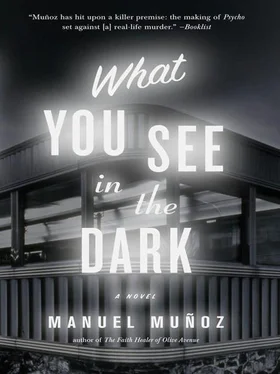More and more, once she got back to the motel, she would find the parking lot empty and Dan nowhere to be seen. He’d taken up with that girl enough to sometimes close the front office too early in the evening, the motel mostly empty. Who knew how many customers had driven away when no one answered the knock at the front office? Tonight, the parking lot was empty for a weekend, and she knew even before she pulled up close to the front office that Dan had already left.
Every once in a while, back at the café, Cal would read the latest news about the new highway, and she would keep up her nonchalance, acting as if she wasn’t already alarmed at the current downturn in business. What was it? The lack of paint? The two new motels nearby that had come up that summer? Was her rate in line with the rest of the city? She thought about how much worse it would get if the highway diverted the traffic away, as Cal kept insisting it would.
Things change, she thought to herself, though this was a slow, creeping change, like water seeping underneath a door.
This evening was going to be like every other evening. Dan had purchased a TV for her from Stewart’s Appliances, a hefty color set to appease her for his absence, but it was a complete waste in her mind, since half the programming was in black and white. These days, she’d come home from the café so exhausted that, with Dan not around to cook for, she had started buying those new frozen dinners. Turkey with gravy, corn, cranberry sauce, and rice that didn’t taste half-bad. She sat in front of the set and found a teleplay about to start, a story set in New York City about a young couple struggling for money and living in a cramped apartment, the husband a drunk who staggered around. His voice blared out of the speakers so loudly that Arlene had been tempted to get up and turn down the sound. Something was strange about the story, these city people struggling like small-town folk, when everything she’d seen about the big city dazzled with easy luxury. Arlene watched with mild interest, turning every once in a while to the parking lot, which remained empty of customers, until she realized that the characters were never going to leave their shoddy apartment, were never going to step out into the glamour she’d seen in magazine spreads. She turned the set off, wrapped a sweater over her shoulders, and walked out to sit on the porch.
Those were the days, she thought, when she could feel change coming. Sitting on the porch as a little girl, her mother trying to retell a story, but all along they had been waiting for her brother. She rubbed her arms against the chill, but it wasn’t just the cold — it was the knowing, the thought of her young self anticipating her mother’s anxiety, wanting to live with it somehow. How had she known such a thing, at her age, going out to the porch at one in the morning because she knew that, come dawn, her brother would be standing at the edge of the dirt road that passed in front of their farmhouse, the Sierra Nevada bright gold in the east, and her mother running to him, crying and smoothing his hair just like she had done to Arlene, and no one in the family saying anything about where he had been?
What would her brother have made of how big Bakersfield had become? He had gone off to Los Angeles after his release from prison, but he had never returned. Just like her husband, Frederick. Her brother had left so long ago that hardly anyone remembered that she had a sibling. She thought of this, how she hid the fact under her tongue, how she rarely told anyone that her own blood had once been in prison. She remembered how everyone from the nearby farms had gathered in the early afternoon to welcome her brother home, his long bus trip from up past Sacramento to Bakersfield. They had led him to the backyard, and the men sat squat-style in a circle, drinking beer, her brother the beginning and the end of the loop, the one who balanced on his haunches the longest without having to get up to stretch. “Prison will harden you to stand anything,” he had bragged, the men laughing, but his voice carried over to her and settled inside like the smoke from his cigarettes, one after the other. He lit one up as a signal to the rest of the men that he didn’t feel like talking, that he’d rather listen to the stories of their years, all that time he’d been locked away.
How much time, Arlene thought as she stared out at the empty parking lot, had he actually been gone?
Those men had spent the entire afternoon like that, the sun coming down and the men still talking, the cigarettes glowing in the dusk. There had been a lot of ground to cover. There had been a lot of ways to say how unfair her brother had had it.
Come along, her mother had said, her hand on Arlene’s head. It’s getting late. Night had come. The ashes in the pit had died down, the food long ago eaten. All the men stayed, dark shadows with dark orange glows.
Arlene had heard them as she lay on the floor in the living room, her eyes once again looking out past the open front door of their old farmhouse, past the porch, and fixing on the dark road outside. The men’s faint talking filled her with a vague comfort, knowing that the dark was not so lonely.
When she had opened her eyes, it was dawn. The front yard was quiet. Her mother was not yet awake. Arlene rose and walked to the kitchen, the open back door. A light dew on the grass, beer bottles strewn everywhere, and the men long gone home. She had never even heard them leave.
Down the hallway, the door to her brother’s room was wide open. Arlene stood in the quiet of the house, looking down the hallway, a chill that she found soothing in the morning air, how it had seeped inside, the doors open for the cross breeze. She stood long enough to listen to the house settle, a creak in the wood somewhere in the roof. She stood and looked down the hallway at the open door to her brother’s bedroom, wondering if he was actually in there or if he’d gone off with the men for more drinking. The answer was right there, just a quiet tiptoe down the hall, the door already open. But instead, Arlene kept standing there, taking in the unfamiliar and delicious chill to the morning air. She was understanding that it did not matter if her brother was in that room right then. Her mother loved him. All that mattered was that he had returned and that life was going to change in their house.
Things change. Everything’s gotta change, Arlene thought, rubbing her arms, and she stepped back into the house.
But how some things stayed. That feeling, standing in the hallway. She could remember it even now.
It was early yet and Arlene was tempted to turn the TV set back on. She was in no mood, though, for another unhappy teleplay, and instead she prepared for bed, turning off the lights in the house one by one and taking one last look out at the parking lot. With some guilt and some defeat, she turned off the motel’s road sign, a little angry that Dan wasn’t around to man the office in the evening hours like he had agreed. But no one was coming. She lay in bed and tried to get her mind to stop racing, to stop thinking of the motel’s demise, and in her frustration she put her hand out to the empty side of the bed.
Sleep came in a strange wave of images: Cal at the counter turning the pages of the newspaper; Vernon drinking from his coffee cup; the young waitresses wiggling their bottoms for the farmers. Sleep brought the Actress, too, enough to wake Arlene a bit to near alertness, wondering what had become of her, Cal never having seen anything in the newspaper headlines announcing a film shoot. She floated back into sleep, her mind flitting from image to image and refusing the clean slate of dreams, a sound thumping and thumping until Arlene opened her eyes, groggy, and realized the sound was real. She sat up, alert, and listened carefully as the faint thump came again, from Dan’s room, and she recoiled for a moment at the possibility that Dan would dare bring that girl into the house when the motel rooms sat empty and secretive.
Читать дальше












